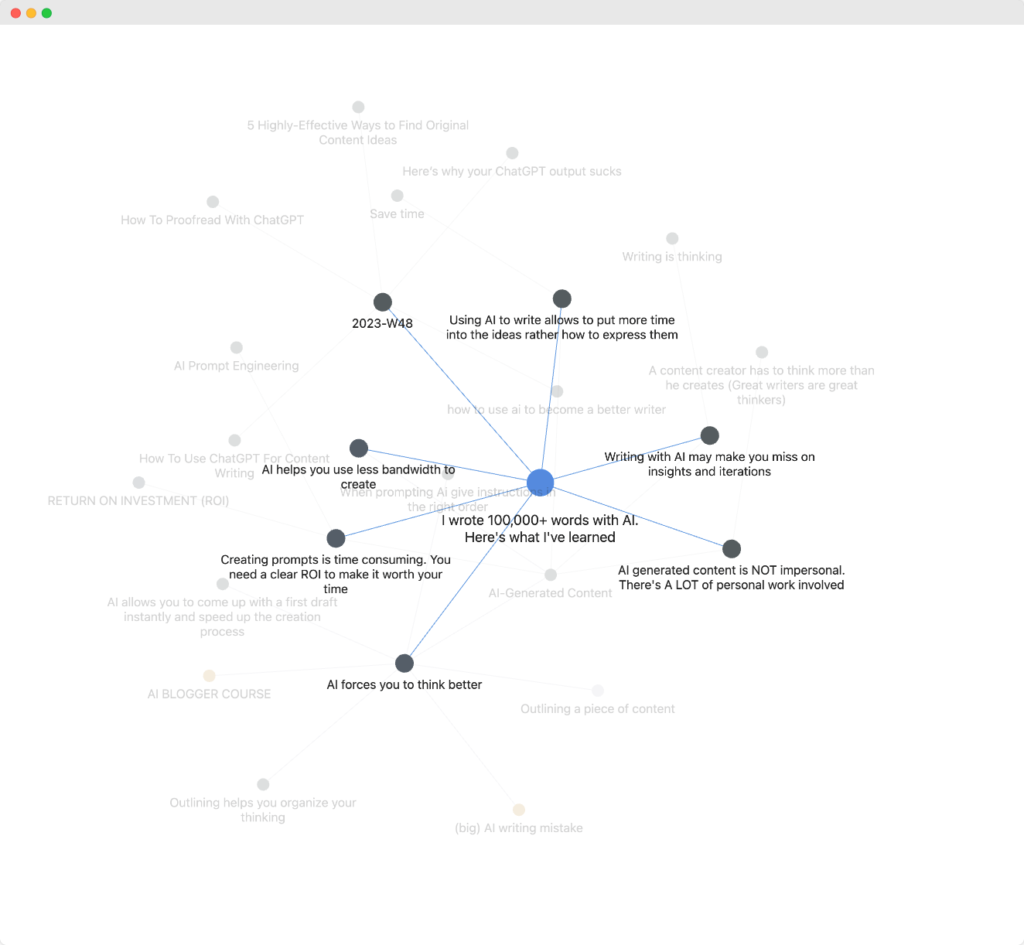This is what writing will look like in 2027
As I’m writing this, there are only two types of writers.
Those who think that writing with AI is a scam and that it can only spit out bland and boring content. Then, those who see the potential but don’t know how to make it work for them.
When ChatGPT came out, I openly mocked it. I thought that it would never be able to write like humans.
Boy, was I wrong.
I’ve spent over 104 hours trying to make AI sound like me… And after seeing the results, I officially repented.
Let’s see what I learned.
A robot can sound like you (sometimes, even better!)
“ChatGPT content is dull and tasteless.”
This is what even the most respectable writers say. I can’t blame them. Because I thought that too after playing around with stupid prompts like “hey bro, write a blog post about X.”
But I then discovered that there are ways to write prompts to make AI sound like you.
There are two ways to do it.
First, by feeding it with your previous writing. (That’s the easy method. But it can quickly eat up a lot of time, especially if you’re writing a lot.)
Second, by training it in your own writing style. (I have a free course that digs deeper into how to do that and includes specific prompts you can use to make ChatGPT sound like you.)
For the first method, you can use a prompt like this:
You're my blog writing assistant. I'm going to provide you with a sample of my writing.
Here it is:
"Enter your content here"
So here is what I want you to do:
1. Analyze the writing style.
2. Match all your further responses in this session to the SAME style.
3. Wait for my further instructions.Then simply follow up with what you want to write: a blog article, a paragraph,… whatsoever.
You’ll be amazed by the results.
Bottom line: Stop thinking that AI content is boring and dull. You can make it sound like you.
Don’t write with AI without this
Most people think that AI will help them think less and be lazy.
But that’s the stupid way of doing it.
After using AI to generate dozens and dozens of blog posts, I found that the most crucial element is to create a great outline. It’s the skeleton of your article.
A great outline:
– flows logically
– embodies your insights
– and fulfills the headline promise
If you don’t take the time to tell AI what you want and what to bake into the content, it will just do its thing. And you end up with a bunch of randomness you don’t want to put your name beneath.
So instead of rushing to open a new ChatGPT session, ask yourself if you have a clear content structure:
– Do your ideas make sense?
– Does the narrative flow logically?
– Are you delivering on the promise of your headline?
If not, then take an extra 5 minutes to re-arrange that before hitting the “generate” button. Otherwise, you’ll waste time writing up follow-up prompts rather than writing the damn piece yourself. (You might even end up writing the piece yourself if you can’t convey the gist of your ideas to AI!)
AI helps you become a better thinker because it requires you to have something interesting to say and forces you to articulate it in the right way so that it can create something worth reading.
AI forces you to think better, not less.
AI forces you to outthink your nasty competitors
Most people rely on ChatGPT to get ideas.
That’s the wrong way to do it. The reason? You’ll end up with the same ideas as everybody else in your niche. That’s because ChatGPT is nothing else than a “prediction machine.” It spits out text based on what is statistically more likely to make sense.
That’s why you see all this generic AI garbage content out there.
The real deal is to come up with your own ideas – then feed ChatGPT with them to flesh out your first draft based on your ideas. In that way, you’ll bypass AI detectors and make sure the content reflects your ideas.
As an example, I almost never rely on ChatGPT to come up with ideas. However, I use a note-taking system. This is where I distill my learnings and insights and then use my notes to feed ChatGPT with my ideas.
Take a look at the ideas that came into this article:

Each dot represents an idea or piece of content I’ve created around the topic. All I have to do is assemble my ideas into an outline.
AI won’t help you write faster
You’ll scoff at me after reading this.
But AI may not help you create content faster. Sometimes, that’s just how it is… The reason is that you still want to edit, and sometimes AI just gets it wrong. But where ChatGPT really helps is by taking off the huge amount of mental bandwidth that is required to write a lot of content.
Before using AI in my blogs, I would write 5,000 words per day on my writing
days, and my brain would be completely fried after the session. I’d also end up with back (and/or) neck pain. The only thing I’d then do is to lay down and doomscroll YouTube like a Zombie.
But with AI, I can write 5,000 to 10,000 words a day and still have bandwidth to do something else after my writing session.
AI makes the creation process easier, not necessarily faster.
The ugly truth behind creating prompts
Creating good prompts is a huge time-sucker.
Honestly – it mostly takes me 4-5 hours to get a set of prompts right. That’s why spending time on prompt engineering without assessing the ROI is like digging a hole without knowing why you’re digging.
You don’t want to “promptify” everything. Only things that you’re doing frequently.
Writing with AI alone will make you dumb
Writing is an iteration game.
When you’re in the process of writing, you often find a new and better way to express what you’ve written. And then you modify accordingly. And this is when you get new insights or realize what you want to say is something completely different.
That’s the reason why you still need to have a writing routine in place to clarify your thoughts.
And that’s why I’m an advocate for still editing the AI-generated content myself.
AI-generated content is not what most people think
Some people think that AI-generated content is soulless…
I disagree.
I treat AI as an assistant. A member of my team that I’m training to create output that sounds like me.
- You’re still the one who comes up with ideas.
- You’re the one who’s thinking about how to structure your content.
- You’re still the one who is supervising and making sure that it really sounds like you.
The only thing that it really replaces is sitting in front of a keyboard and typing.
Typing itself doesn’t have much value.
Where the value resides is in the thinking that you put behind your content. It’s time you invest in solving problems and coming up with new solutions for your audience.
And the less time you have to spend in front of the computer, the more time you have to think and come up with new insights. So it’s really not about being lazy. It’s about working smarter.
Want to write 10X faster with AI?
Enter your email below to get my free course:

